From the 7th to the 9th of September I was visiting the University of Toronto’s Political Science Department. My visit was primarily to attend the oral examination of a splendid PhD thesis on normative transformations written by Simon Pratt. As external examiner, I had the pleasure to read and comment on a thesis that succeeds in offering an alternative framework to study the change of normative structures by drawing on pragmatist assumptions and empirical material from US security policy. I also gave a talk in the department’s seminar series titled “The deformalization of global politics: Insights from a praxiography of counter-piracy governance”. In the talk, I summarized some of my core findings on counter-piracy governance in the light of the debate on informal governance.
Author Archives: admin
Thinking the blue economy as kaleidoscope: Review published
My short review of James Alix Michel’s Rethinking The Oceans – Towards the Blue Economy is available as online first with the Journal of the Indian Ocean Region. In the review, I highlight the productivity of interpreting blue economy as a kaleidoscope, rather than striving for a universal definition. I then argue for the importance of paying more attention to the link between blue economy and maritime security. Free pre-print copies of the review are available here.
Smart Foreign Policy: Seychelles has a new think tank
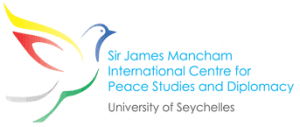 Good politics does not only require solid ideas and plans, but also evidence of what works, and a public debate on what options to pursue. This holds true in any policy field, including foreign and security policy and diplomacy – the areas that Seychelles newest think tank addresses.
Good politics does not only require solid ideas and plans, but also evidence of what works, and a public debate on what options to pursue. This holds true in any policy field, including foreign and security policy and diplomacy – the areas that Seychelles newest think tank addresses.
On Friday the 11th of August, I had the pleasure to attend the inauguration ceremony of the Sir James Mancham International Centre for Peace Studies and Diplomacy (JMPC). Seychelles newest think tank is part of the University of Seychelles and the launch brought together a range of high level policy makers and supporters of the project.
Why is a think tank on peace and diplomacy needed? Peering to other countries that have similar institutions provides answers. In London, Paris, Singapore, Pretoria and elsewhere, think tanks play an important role in developing evidence and ideas for foreign and security policy, in offering a public space for the debate of crucial challenges, but also in training diplomats and policy makers on the basis of state of the art research. These are some of the core roles that the centre will play not only in Seychelles, but also the wider Western Indian Ocean.
Seychelles has an extraordinary foreign policy record. Its diplomats belong to the most successful in the region. Leading the coalition of small island developing states, promoting the blue economy, mediating between positions in organizations such as the African Union or the Southern African Development Community, or chairing the Contact Group on Piracy off the Coast of Somalia successfully for two years, are some of these success stories. With Seychelles now having joined a new club, the club of high income countries, it is time that also its foreign policy progresses to a new level of professionalization. This is where the new centre comes in.
Debating crucial challenges for Seychelles and the region, feeding in expertise to the foreign policy of the country and offering training opportunities are the core objectives of the new centre. While the training programme is under development, and research in areas such as maritime security has just kick-started, the centre has already shown how its events can make a difference in offering thinking space. Earlier this year the centre held one forum on foreign policy strategy and one on reconciliation – core questions for the future of the country. Future events will tackle critical issues such as how to contain illegal fishing activities, or how to interpret the geopolitical situation in the Western Indian Ocean.
The centre is destined to become an intellectual hub for Seychelles and for the Western Indian Ocean region. As an informal tool of diplomacy, it will allow Seychelles to continue its track as a leader in the region. As a knowledge provider, it will inform the regional debate, but also ensure that international actors draw on the adequate expertise of the region.
The centre is destined to become an intellectual hub for Seychelles and for the Western Indian Ocean region. As an informal tool of diplomacy, it will allow Seychelles to continue its track as a leader in the region. As a knowledge provider, it will inform the regional debate, but also ensure that international actors draw on the adequate expertise of the region.
New role at EJIS
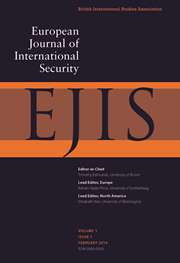 From the 1st of August, I am taking over a new role in the running of the European Journal of International Security (EJIS). As the new Lead Editor (Europe) I will coordinate the efforts of EJIS in Europe and represent the journal at European events. EJIS is the new flagship journal of the British International Studies Association launched in 2016 with Cambridge University Press. It is one of the global leading journals in the field of Security Studies and cognate disciplinary fields (including international law, anthropology or science and technology studies).
From the 1st of August, I am taking over a new role in the running of the European Journal of International Security (EJIS). As the new Lead Editor (Europe) I will coordinate the efforts of EJIS in Europe and represent the journal at European events. EJIS is the new flagship journal of the British International Studies Association launched in 2016 with Cambridge University Press. It is one of the global leading journals in the field of Security Studies and cognate disciplinary fields (including international law, anthropology or science and technology studies).
While the journal has Europe in the title, one of my future roles will be to explain that the journal does not focus on Europe, but is interested in innovative and thought-provoking articles from across the world that contribute to the contemporary understanding of security. Read our mission statement from the first issue here.
Visit of SafeSeas core team to Eastern Africa
From the 19th of July the core team of my research project SAFESEAS – A study of Maritime Security Capacity Building in the Western Indian Ocean, funded by the British Academy’s Sustainable Development Programme is scheduled to visit Seychelles and Kenya for a range of stakeholder consultation meetings and for data gathering. For updates and news see our project website.
Visiting Seychelles over the summer
In July and August, I am visiting the University of Seychelles, where I am an honorary fellow at the Sir James Mancham Centre for Peace Studies and Diplomacy since 2016. I am based in Anse Royale, where the university has its main campus. During my stay, I will support the centre in its activities and continue my research on maritime security in the region, capacity building practice, and creole diplomacy.
CGPCS meeting in Mauritius
The 20th plenary meeting of the Contact Group on Piracy off the Coast of Somalia (CGPCS) is expected to become a milestone in the re-organisation of the response to piracy. The meeting takes place in Mauritius in the first week of July. I will attend the meeting in my capacity as an advisor to the chairmen, the government of Seychelles, and as in the last years will report on lessonsfrompiracy.net on the event. Check it out if you want to follow the event.
Policy brief on maritime domain awareness
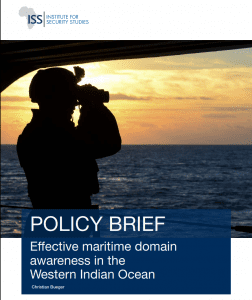 How can maritime domain awareness (MDA) in the Western Indian Ocean be improved? This is the question I address in a new Policy Brief published by the Institute for Security Studies Pretoria. Much of the current MDA work is in the hands of international actors, and although significant capacity building is underway, projects such as the Djibouti Code of Conduct or the MASE project have not led to a functioning MDA structure. I argue that a focus on people and improved coordination would allow to step up the game.
How can maritime domain awareness (MDA) in the Western Indian Ocean be improved? This is the question I address in a new Policy Brief published by the Institute for Security Studies Pretoria. Much of the current MDA work is in the hands of international actors, and although significant capacity building is underway, projects such as the Djibouti Code of Conduct or the MASE project have not led to a functioning MDA structure. I argue that a focus on people and improved coordination would allow to step up the game.
Pirates and Poachers. New article on environmental crime published
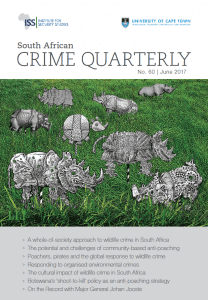 In a recently published article together with Olga Biegus, we are investigating how the global response to wildlife crime can be improved drawing on the lessons from counter-piracy off the coast of Somalia. The article is published in the South African Crime Quarterly. Here is the abstract:
In a recently published article together with Olga Biegus, we are investigating how the global response to wildlife crime can be improved drawing on the lessons from counter-piracy off the coast of Somalia. The article is published in the South African Crime Quarterly. Here is the abstract:
This article aims at identifying how the global response to poaching can be improved and what role South Africa might play in it. To do so, we examine the emerging global wildlife crime regime and the challenges it faces. To offer an understanding of how governance could be improved, we ask how the success in curbing another transnational crime can serve as an example of international coordination. Through a comparison, we aim at identifying core dimensions by which the coordination of counter-poaching can be improved. Our conclusion stresses the importance of a more focused, inclusive and experimental account. We end in outlining a number of core issues that South Africa should start to consider in its policies towards wildlife crime.
Lecture at University of Cape Town
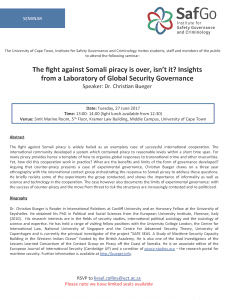 On the 27th of June I will be giving a lecture at the University of Capetown’s Faculty of Law. In the talk I will introduce some of the core insights on global security governance that can be developed from the fight against piracy. The talk is titled “The fight against Somali piracy is over, isn’t it? Insights from a Laboratory of Global Security Governance”. Please find the abstract below. Continue reading
On the 27th of June I will be giving a lecture at the University of Capetown’s Faculty of Law. In the talk I will introduce some of the core insights on global security governance that can be developed from the fight against piracy. The talk is titled “The fight against Somali piracy is over, isn’t it? Insights from a Laboratory of Global Security Governance”. Please find the abstract below. Continue reading